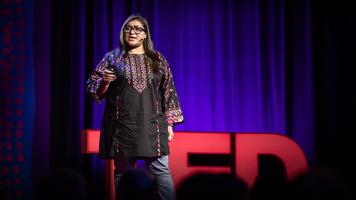Imagine waking up to a stranger -- sometimes multiple strangers
想象一下,睡夢中醒來時旁邊有個陌生人--有時是好幾個陌生人,
questioning your right to existence for something that you wrote online,
因為你在網上寫的文字,而質疑你的生存權,
waking up to an angry message, scared and worried for your safety.
醒來時面對一條憤怒的短信,害怕和擔心自己的安全。
Welcome to the world of cyberharassment.
歡迎來到網絡騷擾的世界。
The kind of harassment that women face in Pakistan is very serious and leads to sometimes deadly outcomes.
巴基斯坦女性面臨的騷擾非常嚴重,有時會導致致命的后果。
This kind of harassment keeps women from accessing the internet -- essentially, knowledge. It's a form of oppression.
這種騷擾使婦女無法上網--從本質上講,就無法獲取知識。這是一種壓迫。
Pakistan is the sixth most populous country in the world,
巴基斯坦是世界第六人口大國,
with 140 million people having access to mobile technologies, and 15 percent internet penetration.
有1.4億人可以使用移動技術,互聯網普及率達到15%。

And this number doesn't seem to go down with the rise of new technologies.
隨著新技術的興起,這個數字似乎還在攀升。
Pakistan is also the birthplace of the youngest Nobel Peace Prize winner, Malala Yousafzai.
巴基斯坦也是最年輕的諾貝爾和平獎得主馬拉拉·優薩福扎伊的出生地。
But that's just one aspect of Pakistan.
但這只是巴基斯坦的一個方面。
Another aspect is where the twisted concept of honor is linked to women and their bodies;
另一方面是,扭曲的榮譽概念與婦女和她們的身體聯系在一起;
where men are allowed to disrespect women and even kill them sometimes in the name of so-called "family honor";
這里允許男性不尊重女性,有時甚至以所謂“家族榮譽”的名義殺害她們;
where women are left to die right outside their houses for speaking to a man on a mobile phone, in the name of "family honor."
女人被扔在屋外等死,只因為用手機與一個男人通話,這樣做的名義是“家族榮譽”。
Let me say this very clearly: it's not honor; it's a cold-blooded murder.
讓我把這一點說清楚:這不是榮譽;這是冷血的謀殺。











